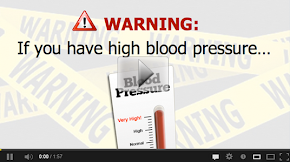High blood pressure Symptoms and sign
This is often called the "silent killer"
because there are usually no high blood pressure Symptoms. If you do
have symptoms, they usually are generally vague or ambiguous.
Most people do not realize they have high blood pressure
until it is picked up by their physician to a routine. Unfortunately, after a
number of years, symptoms of high blood pressure can be a sign of organ
damage has occurred.
That being said, the following symptoms may be
attribute to someone with pre-hypertension or hypertension. These
symptoms can also be attributed to a myriad of other medical conditions:
Nausea
Epistaxis (nosebleeds)
Headaches
Visual disturbances
Lethargy
If it is not treated, chronic or persistent hypertension
can cause serious damage to organs. Again, these high blood pressure
Symptoms can be caused by a myriad of other medical conditions:
Heart failure
Kidney failure
Blindness
Race
Your annual check-up with your doctor should include checking
blood pressure. A one-time high reading does not mean that you are hypertensive.
If it is high, your doctor will take you back to another reading. It was only
after a number of readings will be a decision is made. It is always best to
make you the controls taken at the same time each day. Such as blood
pressure varies throughout the world throughout the day, your doctor may
carry a portable device for twenty-four hours. These machines automatically
record your blood pressure at regular intervals.
If you have mild symptoms above, it is probably not
necessary to see a doctor immediately. If you are concerned about the well, the
best course of action is to see your GP immediately.
Obviously, if you have one of the more serious symptoms,
which can lead to organ damage, train a doctor immediately to your doctor or
emergency department is indicated.
Once it has been established that you have hypertension,
your doctor may discuss changes in lifestyle or if you have passed the stage of
prehypertension, and the drug can be justified. By changing some of your
lifestyle choices, your blood pressure will reduce in most cases. These
lifestyle changes can include losing weight, quitting smoking, getting more
exercise and a healthy diet.
If you have just a high blood pressure Symptoms, or more
likely not at all, you should check on a regular basis.














.jpg)




0 comments:
Post a Comment